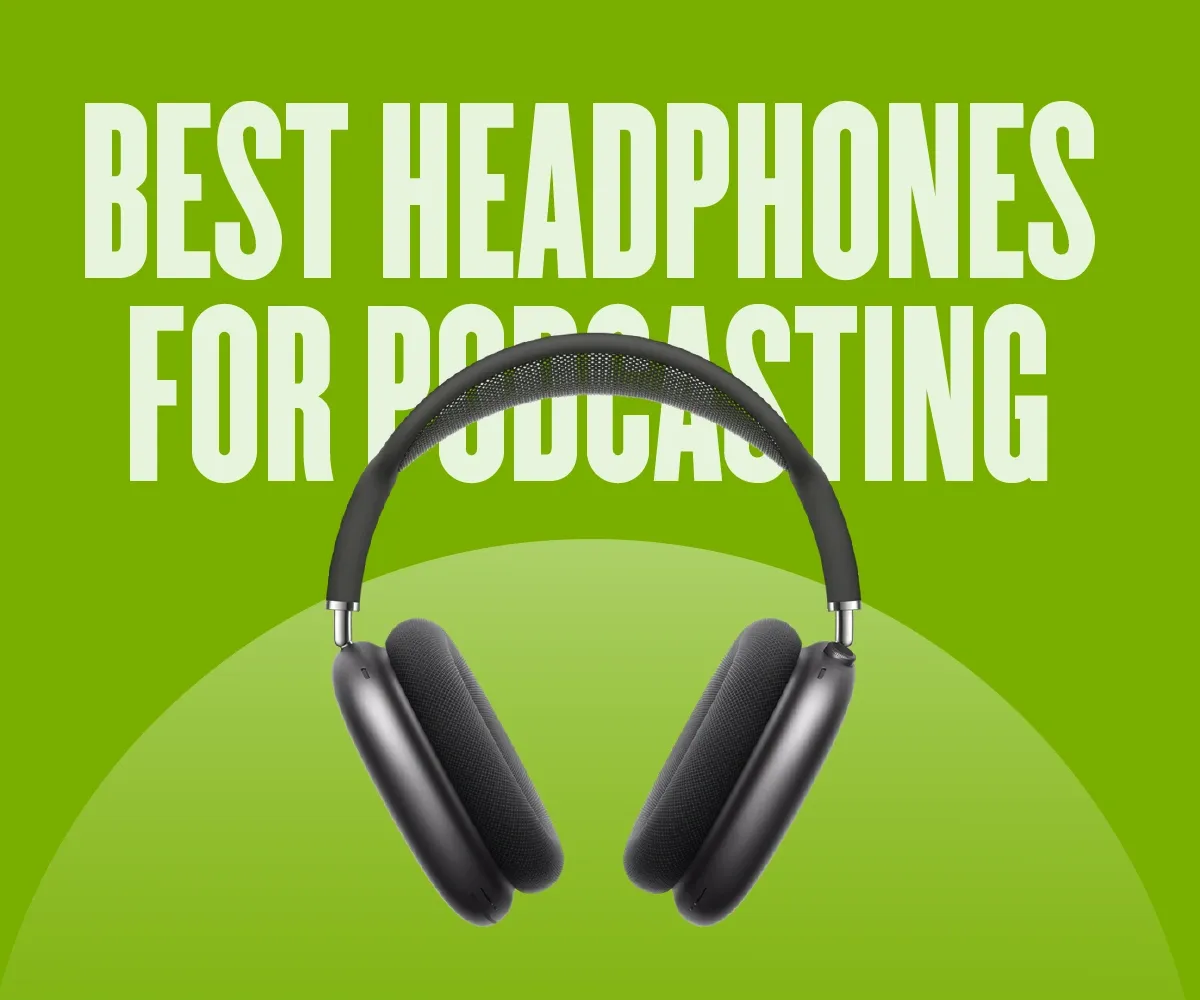As podcasting becomes more popular than ever, many aspiring podcasters are looking for the right headphones for their show. Whether you’re just getting started or your podcast is already up and running, finding the best headphones for podcasting can make a huge difference in sound quality.
In this comprehensive guide, we’ll go over everything you need to know about choosing the right set of headphones for podcasting. We’ll cover topics such as noise-canceling options, comfort features, and sound quality. We’ll also provide a list of suggested headphones so you can be sure that your investment is a wise one.
Why Headphones Matter
For podcasters, headphones are not just an accessory; they are an indispensable tool that ensures audio excellence and elevates the overall quality of their production. A good pair of headphones is crucial for:
Precise Audio Monitoring
Podcasters rely on headphones to monitor their recordings with precision. Quality headphones allow them to hear every nuance of their voice, detect background noise, and identify any audio imperfections that might go unnoticed otherwise. This real-time feedback is invaluable for making necessary adjustments during recording or editing, leading to a cleaner and more professional final product.
Noise Isolation
Recording environments are rarely completely silent. Whether it's the hum of appliances, traffic noise, or a distant conversation, unwanted background noise can compromise the quality of a podcast. High-quality headphones with noise isolation capabilities help podcasters focus on their content and reduce the chances of recording disturbances, resulting in cleaner audio recordings.
Consistency
Consistency in audio quality is crucial for building and retaining a podcast's audience. Using the same pair of headphones throughout the production process ensures that what you hear during recording and editing is what your listeners will hear. This consistency helps maintain a uniform listening experience across episodes, fostering trust and familiarity among your audience.
Audio Detail and Balance
Podcasters also rely on headphones to assess the balance of audio elements, such as voices, music, and sound effects. The ability to hear fine details ensures that the final mix is well-balanced, enhancing the overall listening experience for the audience.
Common Headphone Types for Podcasting
The most common headphone designs each have their own unique advantages and disadvantages for each stage of podcast production. Understanding the differences between closed-back, open-back, and in-ear monitors (IEMs) can help you make the right choice for your podcasting needs.
Closed-Back Headphones
Closed-back headphones are designed with sealed ear cups that provide airtight isolation, effectively preventing sound leakage and reducing external noise interference. This sealed construction ensures that the sound you hear is primarily the audio coming through the headphones and not the ambient noise around you. This feature makes them incredibly versatile–suitable for both recording and the meticulous work of audio editing, where accurate audio representation is paramount.
Pros:
Isolation. Closed-back headphones excel at isolating sound, making them an excellent choice for recording in environments with significant background noise. They help you maintain focus on your audio without distractions.
Reduced Sound Leakage. Their closed design minimizes sound leakage, which is particularly beneficial when you're recording close to a sensitive microphone. This, in turn, reduces the need for extensive post-production noise reduction.
Balanced Sound. Closed-back headphones often deliver a balanced sound profile, with clear mid-range frequencies and controlled bass, enhancing vocal clarity during podcast recording and editing.
Cons:
Limited Soundstage. Due to their closed design, closed-back headphones may offer a more confined soundstage, which might impact the spatial accuracy of your audio perception.
Comfort Considerations. Extended use of closed-back headphones can sometimes lead to heat buildup and discomfort, making them less suitable for extremely long recording sessions.
Open-Back Headphones
Open-back headphones feature ear cups with perforations or an open design that allows some sound leakage and provides a more natural soundstage. While they may not be the first choice for recording, they are highly favored for critical listening during the editing process.
Pros:
Natural Sound. Open-back headphones provide a more natural and spacious soundstage, offering a clear representation of spatial cues. This is particularly useful for precise audio editing.
Comfortable Design. Their open nature often results in better breathability and comfort during extended wear, making them ideal for long editing sessions.
Cons:
Sound Leakage. Open-back headphones allow sound to escape, which can be problematic if you're recording in close proximity to a microphone, potentially necessitating additional soundproofing measures.
Limited Isolation. They offer minimal isolation from external noise, making them less suitable for recording in noisy environments.
In-Ear Monitors (IEMs)
In-Ear Monitors, or IEMs, are compact earphones that fit directly into the ear canal, offering a highly portable and discreet podcasting audio solution.
Pros:
Portability. IEMs are incredibly portable, making them an excellent choice for podcasters on the move or those recording in various locations.
Minimal Sound Leakage. They provide minimal sound leakage, reducing the risk of microphone bleed during recording.
Effective Noise Isolation. IEMs often offer exceptional noise isolation, effectively blocking out external distractions for a focused recording experience.
Cons:
Comfort Variability. Comfort with IEMs can vary depending on the design and the fit in your ears. Some users may find them less comfortable during extended recording sessions.
Sound Quality Considerations. While many IEMs offer impressive sound quality, they may not always match the audio precision of over-ear headphones, particularly in the bass frequencies and spatial representation.
What to Look For When Choosing Headphones
When shopping for the perfect pair of headphones to elevate your podcasting game, pay special attention to the following features:
Sound Quality
Unlike regular headphones, which might be optimized for bass-heavy music or feature noise cancellation for commuters, podcasting headphones need to emphasize clarity and precision. Look for headphones with a balanced frequency response, which is vital for podcasters. These headphones provide an accurate representation of audio across the entire spectrum, ensuring that you catch every detail. Beware of models with exaggerated bass or overly bright treble, as they can distort your perception of the audio, potentially leading to subpar sound quality in your podcasts.
Comfort
Never underestimate the importance of comfort, especially during marathon recording or editing sessions. Seek headphones with adjustable headbands, cushioned ear cups, and a lightweight design that guarantees a snug fit without causing discomfort or fatigue. The last thing you want is to be distracted by discomfort when you should be fully immersed in your podcast creation.
Durability
Podcasters need headphones that can endure the rigors of regular use and, perhaps, some travel. Opt for headphones built with sturdy materials and consider models with detachable or replaceable cables. This thoughtful choice not only prolongs the lifespan of your headphones but also ensures that you're prepared for any unforeseen mishaps in your busy podcasting schedule.
Connectivity
The choice between wired and wireless headphones largely depends on your personal preference and recording setup. Wired headphones are generally favored for their superior audio quality and reliability, making them ideal for studio setups where audio precision is paramount. On the other hand, wireless options offer greater flexibility and freedom of movement, which can be a game-changer for podcasters who prefer to record on the go or conduct interviews in diverse environments. Consider your workflow and requirements when making this decision, as it can significantly impact your podcasting experience.
Best Headphones for Podcasting
Now let's take a look at some suggested headsets that make great choices when it comes to selecting the best headphones for podcasting in 2023:
1) Sony MDR-7506:
Sony MDR 7506 gets recommended by some of the top podcasters out there. These headphones are celebrated for their remarkable sound quality, often surpassing models twice their price range. With an internal balance that borders on perfection, the MDR 7506 allows you to discern the subtlest of tones in your voice recordings, presenting your voice in its truest form.
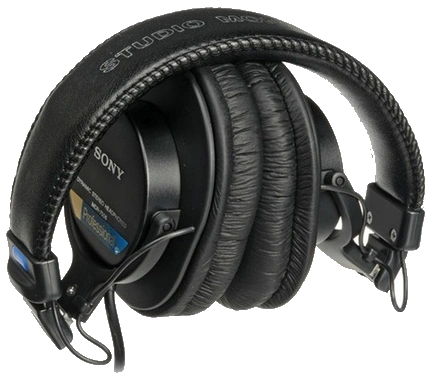
Comfort is a hallmark of the MDR 7506. Designed for prolonged use, these headphones feature a durable coiled cable and various passive noise-canceling elements. The padding, while not overly thick, offers a comfortable experience during extended podcasting sessions.
The closed-ear design and foldable structure enhance their practicality, facilitating easy travel and storage for podcasters on the move. The wide frequency response range of the MDR 7506, more than sufficient for typical podcast content encompassing dialogue, music, and effects, ensures that you capture every detail in your audio recordings. Additionally, these headphones excel at identifying imperfections in your recordings, making them an invaluable tool in podcast production.
Popular Podcasters Who Use Sony Headphones:
Ira Glass, host (This American Life)
Sarah Koenig, host (Serial)
Roman Mars, host (99% Invisible)
Anna Faris, host (Unqualified)
2) Sennheiser HD280 Pro:
This is another classic option favored by some familiar names. With a sensitivity of 103 dB SPL/V, the Sennheiser HD280 Pro faithfully captures the nuances in your recordings, ensuring the clarity and richness of your podcast content. Its impressive frequency response range, spanning from 8 Hz to 25 kHz, allows podcasters to explore the full spectrum of sound, from deep bass notes to delicate trebles.
One standout feature is its advanced passive noise reduction technology, designed explicitly to block out ambient sounds. For podcasters recording in bustling environments or editing in noisy spaces, this feature ensures pristine audio playback, devoid of any unwanted distractions.
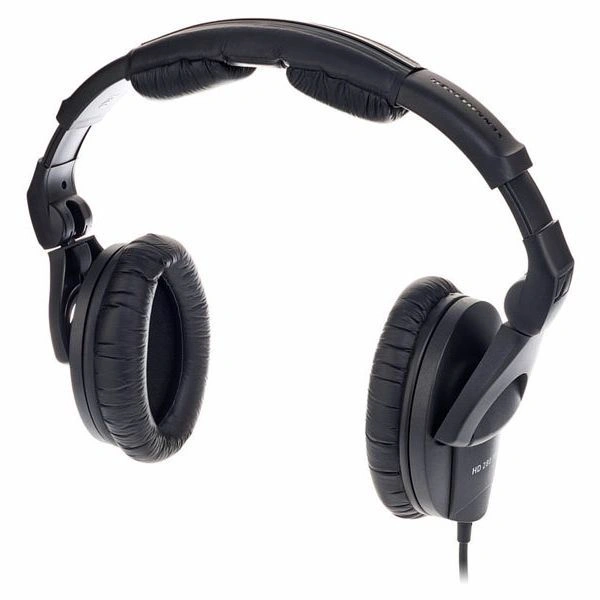
Popular Podcasters Who Use Sennheiser Headphones:
Joe Rogan, host (The Joe Rogan Experience)
Marc Maron, host (WTF with Marc Maron)
Grace Helbig, host (Not Too Deep)
3) Audio Technica ATH-M50x:
Audio-Technica is renowned for producing headphones known for their exceptional sound quality. Among their lineup, the Audio-Technica ATH-M50x headphones stand out as top-tier choices for podcasters. These headphones offer a distinct audio profile – crisp and unembellished, with a balanced tonal quality that faithfully reproduces your voice as you hear it in reality.
Comfort is a paramount feature of the ATH-M50x. Designed for extended usage, these headphones feature large cups that encompass your ears without exerting pressure. Their flexible construction, incorporating metal expanders, ensures a secure and comfortable fit for heads of any size. Additionally, the cups swivel 90 degrees, accommodating one-ear listening, a preference of some podcasters.
The ATH-M50x headphones excel in delivering precise, detailed audio, making them ideal for podcast editing where audio quality is paramount. When fine-tuning your podcast content, you can trust these headphones to provide a clean and hyper-detailed listening experience, ensuring that you capture the highest sound quality possible.
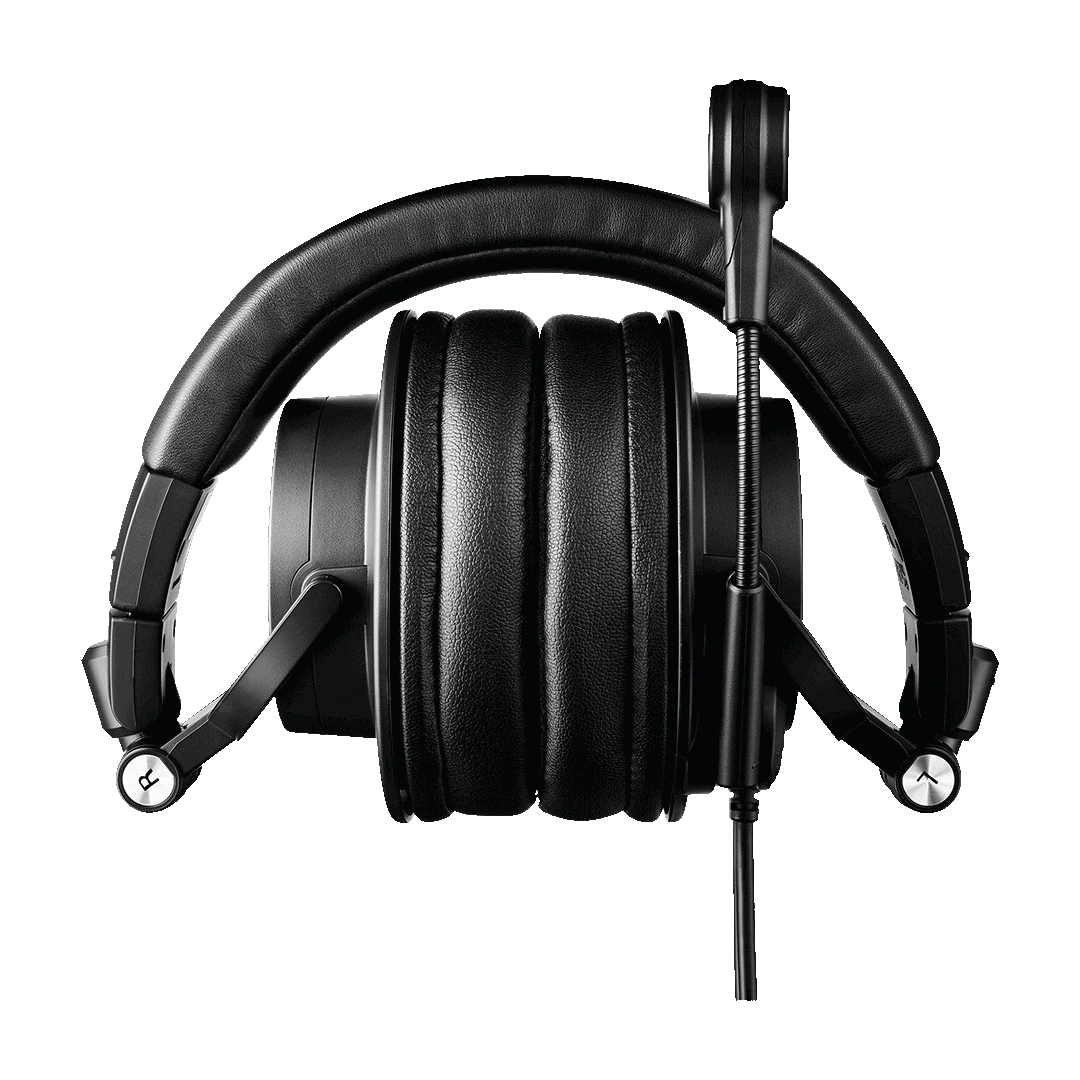
Popular Podcasters Who Use Audio-Technica Headphones:
Ryan Betson, host (The PopCulturists)
Karl “The Lyrical” Smith, host (Game Train Podcast)
4) AKG K240 MK II:
If you're in search of a listening experience imbued with depth and warmth, the AKG K240 MK II headphones are your ideal match. These headphones occupy a distinctive niche in the realm of podcasting gear, blending comfort with unique audio qualities.
While they boast a traditional over-ear design that alleviates pressure and provides a degree of noise isolation, their semi-open ear cups introduce a refreshing twist that enhances natural sound characteristics and elevates the nuances of higher frequencies. It's a blend that grants these headphones a distinct edge.
In terms of comfort, the AKG K240 MK II headphones are hard to beat in their price range. With an adjustable headband and precisely cushioned ear cups, they are designed for extended usage, ensuring you can wear them comfortably for prolonged recording or editing sessions.
What sets these headphones apart are their exceptional sound clarity and impressive dynamic range. Whether you're capturing subtle nuances in voice or delving into the realm of music and effects in your podcast, these headphones deliver an auditory experience that truly stands out.
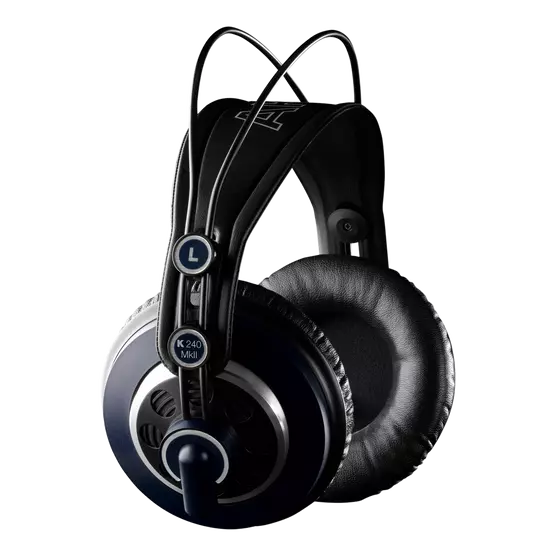
Popular Podcasters Who Use AKG Headphones:
John August and Craig Mazin, hosts (Scriptnotes Podcast)
Chris Curran, host (The Podcast Engineering Show)
Martin Gonzalez, audio engineer (Pushkin Industries)
5) V Moda Crossfade M100:
If budget isn't an issue then this luxurious set acts as the perfect all rounder; combining detailed mid level tones along with rich highs all encased within luxurious Italian leather ear cups – perfect if comfort is key during lengthy recording sessions!
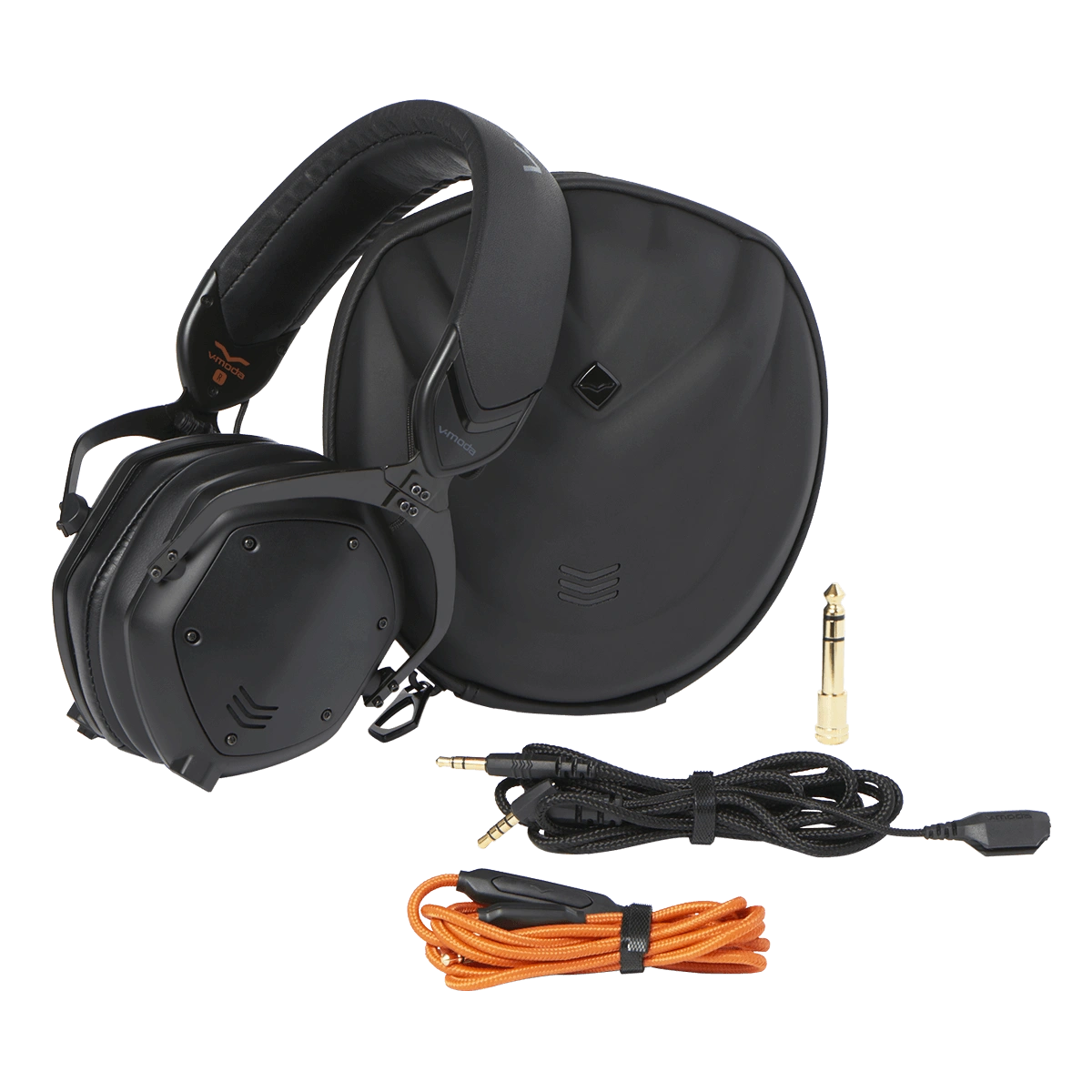
7) Bose Quiet Comfort 35 II:
One of Bose' most popular sets ever released, this lightweight pair offers excellent passive noise cancellation thanks to its advanced Acoustic Noise Cancelling technology – making them perfect if background conversations need cutting out while speaking into microphones.
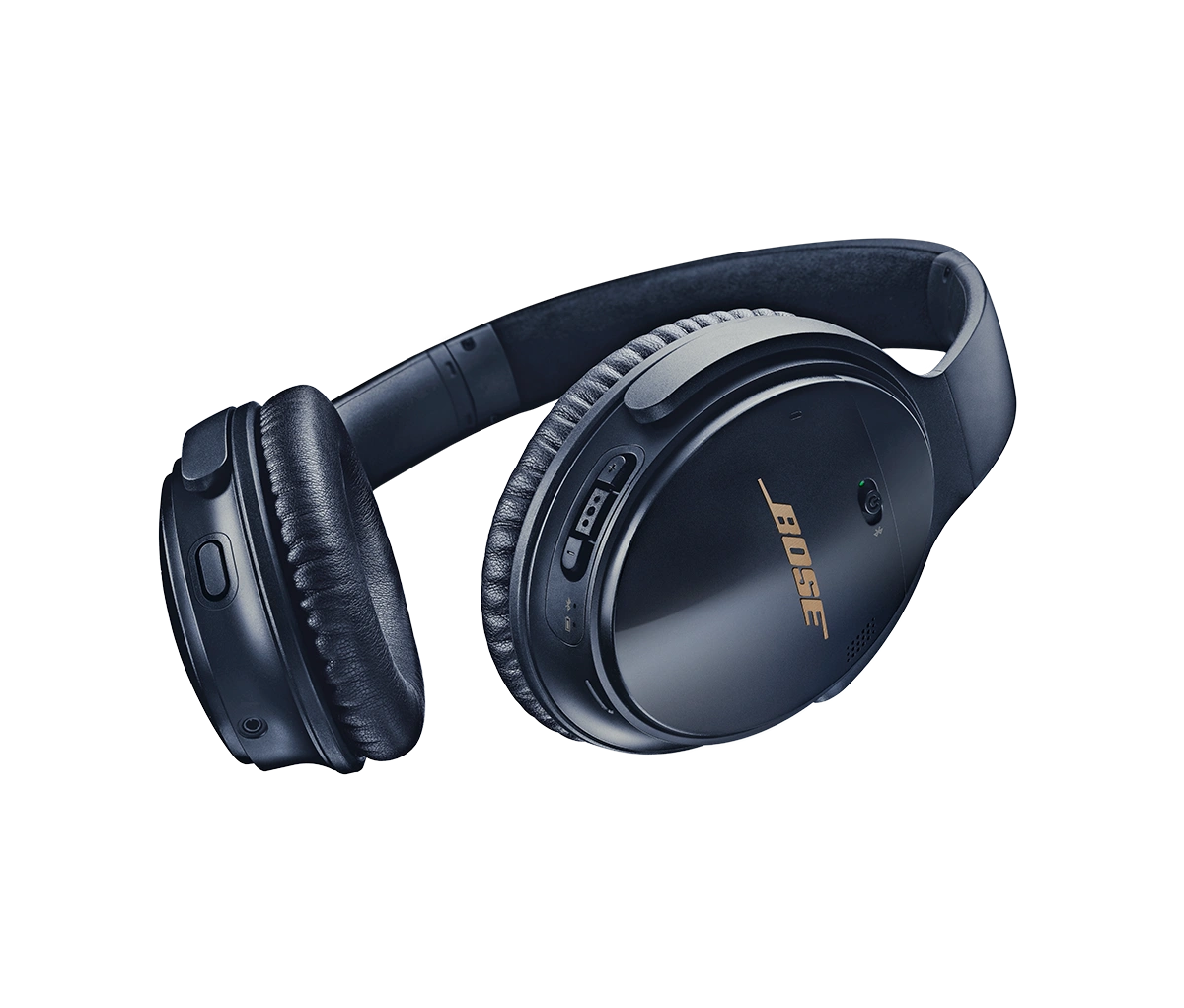
8) Beyerdynamic DT 770 Pro
When it comes to incorporating studio-quality headphones into your podcasting setup, the Beyerdynamic DT 770 Pro headphones should undoubtedly top your list. These 80 Ohm headphones, while demanding a bit more power, reward you with an intricately detailed sound reproduction that's nothing short of exceptional.
The quality of the DT 770 Pro shines through in both its robust build and the included cable. While they may come with a slightly higher price tag, these headphones can serve as the centerpiece of any professional podcasting rig, ensuring your audio reaches its full potential.
In terms of comfort, they excel at reducing head and ear pressure, ensuring that your podcasting sessions remain pain-free and productive. The custom diaphragms deliver a balanced sound stage with a noticeable emphasis on the vocal range, an ideal characteristic for podcasters.
Notably, the high-fidelity drivers within these headphones are true workhorses, capable of handling sustained high volumes without compromising on audio quality. With their studio-quality audio reproduction, the DT 770 Pro headphones aren't just for recording; they also excel during the production and mixing phases. In essence, these headphones are a versatile, all-in-one solution that can elevate your podcasting experience to professional heights.
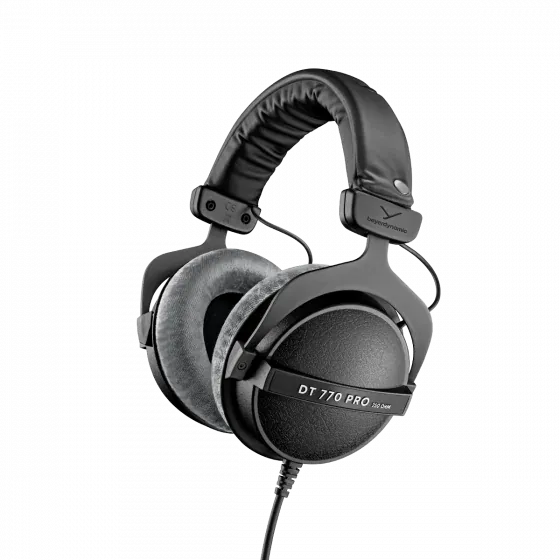
Popular Podcasters Who Use Beyerdynamic Headphones:
Dax Shepherd (Armchair Expert)
Aileen Xu (The Lavendaire Lifestyle)
Best Earbuds for Podcasting
Don't like the idea of wearing big over-the-ear headphones for podcasting? Here's the best in-ear headphones or "earbuds".
1) Shure SE215
These earbuds are perfect for podcasters who want to record on the go. They have a detachable cable and come with a carrying case. They are priced at around $150.
2) Sennheiser Momentum True Wireless 2
These earbuds offer excellent sound quality and noise-cancellation features, making them perfect for podcasting in noisy environments. They are priced at around $299.
3) Bose QuietComfort Earbuds II
Bose claim that these buds can actually learn the shape of your ear canal to optimize noise cancellation and sound performance. Usually around $280.
FAQ
Do I need a microphone built into my headphones for podcasting?
No, you don’t need headphones with microphone for podcasting. However, having access to an external mic will allow you to make better recordings with more accuracy and clarity.
Can I use my regular headphones for podcasting or do I need special headphones?
You can use regular headphones for podcasting, but they likely will not provide the same sound quality and noise isolation of specialty podcasting headphones. Investing in a good pair of headphones designed specifically for audio production or podcasting is well worth it if you want high-quality recordings. Nevertheless, if you don’t have the budget to invest in quality podcast equipment, don’t worry. With the right podcasting software and some noise isolation tools, you can still get a professional sounding podcast with nothing but your laptop.
Are over-ear or on-ear headphones better for podcasting?
It really depends on your personal preferences and what type of audio content you create. Generally speaking, over-ear headphones for podcasting tend to offer more noise isolation and comfort compared to their on-ear counterparts which makes them a great choice for podcasting. However, if portability is important, on-ear models are likely the better option as they tend to be lighter and easier to travel with.
Are wireless headphones good for podcasting?
Wireless headphones can be a great choice for podcasting as they provide freedom of movement while also eliminating any potential cable interferences that may occur during recording sessions. Just make sure that they support a reliable connection (Bluetooth 5.0 or better) and have decent battery life so you don’t have to worry about constantly charging them.
What is the impact of frequency response on headphones for podcasting?
The frequency response of headphones will have a major impact on the audio quality of your recordings as it indicates how accurately they are able to reproduce sound. When looking for headphones for podcasting, you should look for models that offer expansive frequency ranges (8 Hz - 25 kHz) and accurate playback so you can ensure you have the highest quality recordings possible.
What are the best budget headphones for podcasting?
One of the best options of budget headphones for podcasting is the Sony MDR-7506, as it offers an expansive frequency response range and accurate sound reproduction at an affordable price. Additionally, its rugged build makes it perfect for recording in any environment.
How do I choose the best headphones for my podcasting needs?
The best way to choose the right headphones for your podcasting needs is to consider what type of content you create, where you record and the quality of sound that you want. Additionally, look into features such as frequency response range, noise isolation capabilities and comfort when making your decision. Lastly, make sure that your budget matches up with what’s available. By taking all these factors into consideration, you’ll be sure to select the perfect headset for your podcasting needs.
